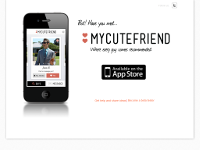Why You Should Try Dating On Facebook
- Wednesday, June 25 2014 @ 06:57 am
- Contributed by: ElyseRomano
- Views: 1,572
Now here's some news you probably never expected to hear: not only are more people meeting on social networks (which doesn't come as a surprise to anyone who hasn't been living in a remote jungle for the last decade), but their relationships are also happier than those that begin off-line in more traditional ways.
What?
Yes, apparently it's true. Jeffrey Hall, associate professor of Communication Studies at the University of Kansas, discovered that 7% of people who married after meeting online didn’t meet in matchmaking chat rooms or on online dating sites. In fact, they met for the first time on social networking sites like Facebook.
Surprised by his finding, given that dating isn’t the purpose of social networking websites, Hall decided to investigate further. He was curious to learn more about who is meeting their significant others this way and how well their relationships fair. He put together a sample of 19,131 participants who'd been married once between 2005 in 2012. Each participant had met their partner in one of four ways: online dating sites, e-mail or instant messaging, online communities like chat rooms or virtual reality games, or social networking sites.
Hall found that those who met on social networking sites were more likely to be younger, married more recently, and African-American compared to those who met via other digital methods. He also found that, when compared based on marital satisfaction, the partners who met via social networking reported being just as happy as those who were introduced any other way – even on online dating sites, which are designed to nurture connection and tout their compatibility benefits.
What surprised Hall even more, however, was that the relationships that started on social media were actually happier than those that begin offline, in traditional ways like being introduced by mutual friends.
What explains his findings?
Hall has a couple of theories. “I think that social networking is the digital version of being introduced by friends,” he says. So although the medium has changed in the 21st century, the method has not. Social networks also have another potentially huge advantage over dating services: there is way less pressure. Online dating can be intensely stressful, so it's not hard to believe that romance might blossom better under more relaxed, Facebook friend-ly circumstances.
The result is conversations on social networking sites that are more casual and low risk, and removed from the anxiety of traditional online dating. Low risk + high reward = hello, online romance!


